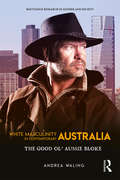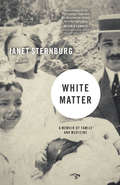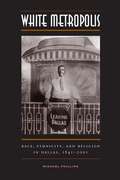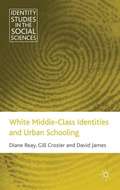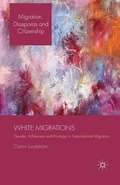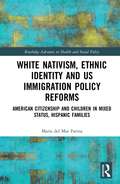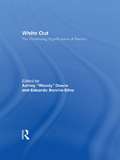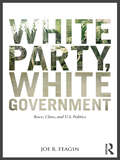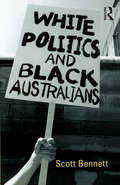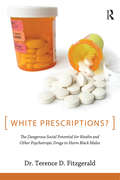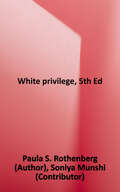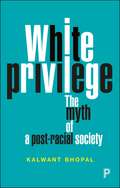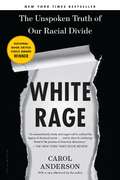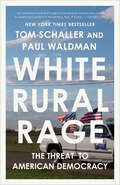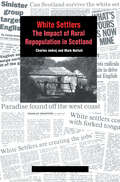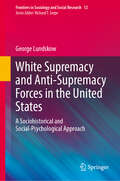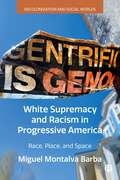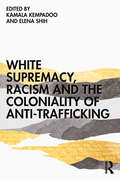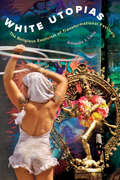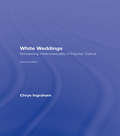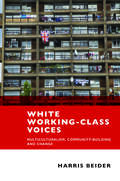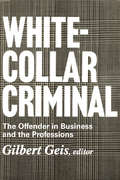- Table View
- List View
White Logic, White Methods: Racism And Methodology
by Eduardo Bonilla-Silva Tukufu ZuberiIn this collection of essays, the authors examine how racial considerations have affected the way social science is conducted; how issues are framed, and data is analyzed. With an assemblage of leading scholars, White Logic, White Methods explores the possibilities and necessary dethroning of current social research practices, and demands a complete overhaul of current methods, towards multicultural and pluralist approach to what we know, think, and question.
White Masculinity in Contemporary Australia: The Good Ol’ Aussie Bloke (Routledge Research in Gender and Society)
by Andrea WalingSpanning the disciplines of sociology, history, media and cultural studies, and popular culture, this book offers a historical exploration of Australian masculine tropes and an examination of contemporary representations of masculinity in the media. With attention to a range of thematic issues, including race, gender, sexuality, mythmaking, media representation, class, and nationality, it draws on new qualitative research and interview material to investigate the ways in which everyday Australian men take up or reject such ideas. White Masculinity in Contemporary Australia thus explores the contradictory resistance to and adoration of ideals of masculinity, forms of Othering used to differentiate the practice of "good" masculinity from that of "bad" masculinity, the relationship between heterosexuality, masculinity and Australian sporting culture as central to ideals of masculinity, and the existence of differing pressures to be masculine. As such it will appeal to scholars across the social sciences with interests in gender and sexuality, Australian studies, and contemporary popular culture.
White Matter
by Janet SternburgWhite Matter: A Memoir of Family and Medicine is the story of a Bostonian close-knit Jewish working-class family of five sisters and one brother and the impact they and their next generation endured due to the popularization of lobotomy during the 20th century. When Janet Sternburg's grandfather abandoned his family, and her uncle, Bennie, became increasing mentally ill, Sternburg's mother and aunts had to bind together and make crucial decisions for the family's survival. Two of the toughest familial decisions they made were to have Bennie undergo a lobotomy to treat his schizophrenia and later to have youngest sister, Francie, undergo the same procedure to treat severe depression. Both heartrending decisions were largely a result of misinformation disseminated that popularized and legitimized lobotomy.Woven into Sternburg's story are notable figures that influenced the family as well as the entire medical field. In 1949, Egas Moniz was awarded the Nobel Prize in Medicine for developing the lobotomy, and in the three years that followed his acceptance of the award, more Americans underwent the surgery than during the previous 14 years. By the early 1950s, Walter Freeman developed an alternate technique for lobotomy, which he proselytized during his travels throughout the country in a van he dubbed the "Lobotomobile."The phrase "prefrontal lobotomy" was common currency growing up in Janet Sternburg's family and in White Matter she details this scientific discovery that disconnects the brain's white matter, leaving a person without feelings, and its undeserved legitimization and impact on her family. She writes as a daughter consumed with questions about her mother and aunts-all well meaning women who decided their siblings' mental health issues would be best treated with lobotomies. By the late 1970s, the surgical practice was almost completely out of favor, but its effects left patients and their families with complicated legacies as well as a stain on American medical history. Every generation has to make its own medical choices based on knowledge that will inevitably come to seem inadequate in the future. How do we live with our choices when we see their consequences?
White Metropolis
by Michael PhillipsFrom the nineteenth century until today, the power brokers of Dallas have always portrayed their city as a progressive, pro-business, racially harmonious community that has avoided the racial, ethnic, and class strife that roiled other Southern cities. But does this image of Dallas match the historical reality? In this book, Michael Phillips delves deeply into Dallas's racial and religious past and uncovers a complicated history of resistance, collaboration, and assimilation between the city's African American, Mexican American, and Jewish communities and its white power elite. Exploring more than 150 years of Dallas history, Phillips reveals how white business leaders created both a white racial identity and a Southwestern regional identity that excluded African Americans from power and required Mexican Americans and Jews to adopt Anglo-Saxon norms to achieve what limited positions of power they held. He also demonstrates how the concept of whiteness kept these groups from allying with each other, and with working- and middle-class whites, to build a greater power base and end elite control of the city. Comparing the Dallas racial experience with that of Houston and Atlanta, Phillips identifies how Dallas fits into regional patterns of race relations and illuminates the unique forces that have kept its racial history hidden until the publication of this book.
White Middle-Class Identities and Urban Schooling
by David James Diane Reay Gill CrozierThis book examines experiences and implications of 'against-the-grain' school choices, where white middle class families choose ordinary and 'low performing' secondary schools for their children. It offers a unique view of identity formation, taking in matters like family history, locality and whiteness.
White Migrations: Gender, Whiteness and Privilege in Transnational Migration (Migration, Diasporas and Citizenship Series)
by Catrin LundströmFrom a multi-sited ethnography with Swedish migrant women in the United States, Singapore and Spain, the book explores gender vulnerabilities and racial and class privilege in contemporary feminized migration, filling a gap in literature on race and migration.
White Nativism, Ethnic Identity and US Immigration Policy Reforms: American Citizenship and Children in Mixed Status, Hispanic Families
by Maria del FarinaAnalysing US immigration and deportation policy over the last twenty years, this book illustrates how US immigration reform can be conceived as a psychological, legal, policy-driven tool which is inexorably entwined with themes of American identity, national belonging and white nativism. Focusing on Hispanic immigration and American-born children of Mexican parentage, the author examines how engrained, historical, individual and collective social constructions and psychological processes, related to identity formation can play an instrumental role in influencing political and legal processes. It is argued that contemporary American immigration policy reforms need to be conceptualized as a complex, conscious and unconscious White Nativist psychological, legal, defence mechanism related to identity preservation and contestation. Whilst building on existing theoretical frameworks, the author offers new empirical evidence on immigration processes and policy within the United States as well as original research involving the acculturation and identity development of children of Mexican immigrant parentage. It brings together themes of race, ethnicity and American national identity under a new integrated sociopolitical and psychological framework examining macro and micro implications of recent US immigration policy reform. Subsequently this book will have broad appeal for academics, professionals and students who have an interest in political psychology, childhood studies, American immigration policy, constructions of national identity, critical race and ethnic studies, and the Mexican diaspora.
White Out: The Continuing Significance of Racism
by Ashley “Woody” Doane and Eduardo Bonilla-SilvaWhat does it mean to be white? This remains the question at large in the continued effort to examine how white racial identity is constructed and how systems of white privilege operate in everyday life. White Out brings together the original work of leading scholars across the disciplines of sociology, philosophy, history, and anthropology to give readers an important and cutting-edge study of "whiteness".
White Party, White Government: Race, Class, and U.S. Politics
by Joe R. FeaginWhite Party, White Government examines the centuries-old impact of systemic racism on the U.S. political system. The text assesses the development by elite and other whites of a racialized capitalistic system, grounded early in slavery and land theft, and its intertwining with a distinctive political system whose fundamentals were laid down in the founding decades. From these years through the Civil War and Reconstruction, to the 1920s, the 1930s Roosevelt era, the 1960s Johnson era, through to the Ronald Reagan, George H.W. Bush, and Barack Obama presidencies, Feagin exploring the effects of ongoing demographic changes on the present and future of the U.S. political system.
White Politics and Black Australians
by Scott BennettToday, whichever party is in power, Aboriginal issues are very much part of the national agenda. No account of the nature of Australian politics, or discussion of the future of Australian society, can be complete without consideration of the Aboriginal interest. Citizens, whatever their political preferences, are learning that the Aboriginal demand for a full role in society has a profound impact on public life. In White Politics and Black Australians Scott Bennett coolly and dispassionately describes how the aspirations of Aboriginal Australians are expressed through a political system designed, first and foremost, for the white majority. Mabo, Wik, Native Title, Stolen Generation - these are just some of the issues discussed here. In a field so often characterised by rhetoric rather than analysis, here is an account which acknowledges the day-to-day reality of political contest.
White Prescriptions?: The Dangerous Social Potential for Ritalin and Other Psychotropic Drugs to Harm Black Males
by Terence D. FitzgeraldFor all the debates about black males and their role in American society, there has been little attention to a dangerous and growing trend: the overprescription of Ritalin and other behavioral drugs. This book reveals how and why black males are disproportionately targeted and controlled by American schools in ways that hamper and endanger their educational success. Fitzgerald shows how the government, medical practitioners, and the pharmaceuticals industry have facilitated this oppressive trend, setting it against a larger historical backdrop of racism in American education.
White Privilege
by Paula S. RothenbergThis book is an exceptional anthology that expertly presents the significance and complexity of whiteness today while illuminating the nature of privilege and power in our society.
White Privilege: The Myth of a Post-Racial Society
by Kalwant BhopalWhy and how do those from black and minority ethnic communities continue to be marginalised? Despite claims that we now live in a post-racial society, race continues to disadvantage those from black and minority ethnic backgrounds. Kalwant Bhopal explores how neoliberal policy making has increased rather than decreased discrimination faced by those from non-white backgrounds. She also shows how certain types of whiteness are not privileged; Gypsies and Travellers, for example, remain marginalised and disadvantaged in society. Drawing on topical debates and supported by empirical data, this important book examines the impact of race on wider issues of inequality and difference in society.
White Racism: The Basics
by Joe R. Feagin Hernan Vera Pinar BaturThis book incorporates a range of new material on racist events and incidents across the United States. It includes a few new concepts and some of the original concepts about individual and institutionalized racism in the United States.
White Rage: The Unspoken Truth of Our Racial Divide
by Carol Anderson<P>From the end of the Civil War to our combustible present, an acclaimed historian reframes the conversation about race we must continue to have, chronicling the powerful forces that have long opposed black progress in America. <P>As Ferguson, Missouri, erupted in August 2014, with media commentators referring to the angry response of African Americans yet again as "black rage," historian Carol Anderson wrote a remarkable op-ed in the Washington Post showing that this was, instead, "white rage" at work. "With so much attention on the flames," she writes, "everyone had ignored the kindling." <P>Now, in her eloquent and powerfully argued narrative, Anderson makes clear that since 1865 and the passage of the Thirteenth Amendment, every time African Americans have made advances toward full participation in our democracy, white reaction--usually in the courts and legislatures--has fueled a deliberate and relentless rollback of their gains. <P>The end of the Civil War and Reconstruction was greeted with the Black Codes and Jim Crow. <P>The Great Migration north was physically opposed in many Southern states, and blacks often found conditions in the North to be no better. The Supreme Court's landmark 1954 Brown v. Board of Education decision was met with the shutting down of public schools throughout the South while taxpayer dollars financed segregated white private schools. <P>The Civil Rights Act of 1964 and Voting Rights Act of 1965 triggered a coded but powerful response--the so-called Southern Strategy and the War on Drugs that disenfranchised and imprisoned millions of African Americans. <P>The election of Barack Obama, and the promise it heralded of healing our racial divide, precipitated instead a rash of voter suppression laws in Southern and swing states, while the Supreme Court's decision in Shelby County v. Holder gutted a key provision of the Voting Rights Act. <P>Carefully linking these and other historical flash points when social progress for African Americans was countered by deliberate and cleverly crafted white opposition, Anderson pulls back the veil that has long covered punitive actions allegedly made in the name of protecting democracy, fiscal responsibility, or protection against fraud. <P>Compelling and dramatic in the unimpeachable history it relates over a century and a half, White Rage will add an important new dimension to the national conversation about race in America. <P><b>A New York Times Bestseller</b>
White Rage: The Unspoken Truth of Our Racial Divide
by Carol AndersonNational Book Critics Circle Award Winner New York Times Bestseller A New York Times Notable Book of the Year A Washington Post Notable Nonfiction Book of the Year A Boston Globe Best Book of 2016 A Chicago Review of Books Best Nonfiction Book of 2016 From the Civil War to our combustible present, acclaimed historian Carol Anderson reframes our continuing conversation about race, chronicling the powerful forces opposed to black progress in America. As Ferguson, Missouri, erupted in August 2014, and media commentators across the ideological spectrum referred to the angry response of African Americans as "black rage," historian Carol Anderson wrote a remarkable op-ed in The Washington Post suggesting that this was, instead, "white rage at work. With so much attention on the flames," she argued, "everyone had ignored the kindling. " Since 1865 and the passage of the Thirteenth Amendment, every time African Americans have made advances towards full participation in our democracy, white reaction has fueled a deliberate and relentless rollback of their gains. The end of the Civil War and Reconstruction was greeted with the Black Codes and Jim Crow; the Supreme Court's landmark 1954 Brown v. Board of Education decision was met with the shutting down of public schools throughout the South while taxpayer dollars financed segregated white private schools; the Civil Rights Act of 1964 and Voting Rights Act of 1965 triggered a coded but powerful response, the so-called Southern Strategy and the War on Drugs that disenfranchised millions of African Americans while propelling presidents Nixon and Reagan into the White House, and then the election of America's first black President, led to the expression of white rage that has been as relentless as it has been brutal. Carefully linking these and other historical flashpoints when social progress for African Americans was countered by deliberate and cleverly crafted opposition, Anderson pulls back the veil that has long covered actions made in the name of protecting democracy, fiscal responsibility, or protection against fraud, rendering visible the long lineage of white rage. Compelling and dramatic in the unimpeachable history it relates, White Rage will add an important new dimension to the national conversation about race in America.
White Rural Rage: The Threat to American Democracy
by Paul Waldman Tom SchallerNEW YORK TIMES BESTSELLER • A searing portrait and damning takedown of America&’s proudest citizens—who are also the least likely to defend its core principles&“This is an important book that ought to be read by anyone who wants to understand politics in the perilous Age of Trump.&”—David Corn, New York Times bestselling author of American PsychosisWhite rural voters hold the greatest electoral sway of any demographic group in the United States, yet rural communities suffer from poor healthcare access, failing infrastructure, and severe manufacturing and farming job losses. Rural voters believe our nation has betrayed them, and to some degree, they&’re right. In White Rural Rage, Tom Schaller and Paul Waldman explore why rural Whites have failed to reap the benefits from their outsize political power and why, as a result, they are the most likely group to abandon democratic norms and traditions. Their rage—stoked daily by Republican politicians and the conservative media—now poses an existential threat to the United States.Schaller and Waldman show how vulnerable U.S. democracy has become to rural Whites who, despite legitimate grievances, are increasingly inclined to hold racist and xenophobic beliefs, to believe in conspiracy theories, to accept violence as a legitimate course of political action, and to exhibit antidemocratic tendencies. Rural White Americans&’ attitude might best be described as &“I love my country, but not our country,&” Schaller and Waldman argue. This phenomenon is the patriot paradox of rural America: The citizens who take such pride in their patriotism are also the least likely to defend core American principles. And by stoking rural Whites&’ anger rather than addressing the hard problems they face, conservative politicians and talking heads create a feedback loop of resentments that are undermining American democracy.Schaller and Waldman provocatively critique both the structures that permit rural Whites&’ disproportionate influence over American governance and the prospects for creating a pluralist, inclusive democracy that delivers policy solutions that benefit rural communities. They conclude with a political reimagining that offers a better future for both rural people and the rest of America.
White Settlers: The Impact of Rural Repopulation in Scotland
by Mark Nuttall Charles JedrejFirst Published in 1996. Routledge is an imprint of Taylor & Francis, an informa company.
White Supremacy and Anti-Supremacy Forces in the United States: A Sociohistorical and Social-Psychological Approach (Frontiers in Sociology and Social Research #12)
by George LundskowThis book applies the most recent research in social psychology to decisive historical events that arguably built white supremacy as a cultural force, institutional system, and dominant social character. Simultaneously, the discussion considers the progressive counter-forces that have and continue to challenge white supremacy, and how this dialectical battle has brought the United States to the polarizations of the present day. The book builds a four-part argument. First, it considers the origins of white supremacy in the United States, and how some people uphold it today. Second, it discusses personality types that find white supremacy appealing. Third, it lays out the sociohistorical patterns that promoted white supremacy, rewarded people who practiced it, and created generations of people who find meaning and comfort in racist, misogynist, and heteronormative domination. Fourth, it discusses the social counterforces that challenge white supremacy and links these to personality types as well. Overall, the book examines how social character correlates with differing personality types, resulting in very different social movements, cultural expressions, political activities, and daily interactions.
White Supremacy and Racism in Progressive America: Race, Place, and Space (Decolonization and Social Worlds)
by Miguel Montalva BarbaThis book examines the connections between race, place, and space, and sheds light on how they contribute and maintain racial hierarchies. The author focuses on the White residents of Jamaica Plain, Massachusetts, which, according to the Cooks Political Report Partisan Voting Index, is the most liberal district in the state and 15th in the United States of America. The book uses settler colonialism and critical race theory to explore how self-identified progressive White residents perceive their gentrifying neighborhood and how they make sense of their positionality. Using the extended case method, as well as in-depth interviews, participant observation, content analysis and visual/media analysis, the author reveals how systemic racialized inequality persists even in a politically progressive borough.
White Supremacy, Racism and the Coloniality of Anti-Trafficking
by Kamala Kempadoo Elena ShihGlobal efforts to combat human trafficking are ubiquitous and reference particular ideas about unfreedoms, suffering, and rescue. The discourse has, however, a distinct racialized legacy that is lodged specifically in fears about "white slavery," women in prostitution and migration, and the defilement of white womanhood by the criminal and racialized Other. White Supremacy, Racism and the Coloniality of Anti-Trafficking centers the legacies of race and racism in contemporary anti-trafficking work and examines them in greater detail.A number of recent arguments have suggested that race and racism are not only visible, but vital, to the success of contemporary anti- trafficking discourses and movements. The contributors offer recent scholarship grounded in critical anti- racist perspectives that reveal the historical and contemporary racial working of anti- trafficking discourses and practices globally—and how these intersect with gender, citizenship, sexuality, caste and class formations, and the global political economy.
White Utopias: The Religious Exoticism of Transformational Festivals
by Amanda J. LuciaTransformational festivals, from Burning Man to Lightning in a Bottle, Bhakti Fest, and Wanderlust, are massive events that attract thousands of participants to sites around the world. In this groundbreaking book, Amanda J. Lucia shows how these festivals operate as religious institutions for "spiritual, but not religious" (SBNR) communities. Whereas previous research into SBNR practices and New Age religion has not addressed the predominantly white makeup of these communities, White Utopias examines the complicated, often contradictory relationships with race at these events, presenting an engrossing ethnography of SBNR practices. Lucia contends that participants create temporary utopias through their shared commitments to spiritual growth and human connection. But they also participate in religious exoticism by adopting Indigenous and Indic spiritualities, a practice that ultimately renders them exclusive, white utopias. Focusing on yoga’s role in disseminating SBNR values, Lucia offers new ways of comprehending transformational festivals as significant cultural phenomena.
White Weddings: Romancing Heterosexuality in Popular Culture
by Chrys IngrahamThis is a groundbreaking study of our culture's obsession with weddings. By examining popular films, commercials, magazines, advertising, television sitcoms and even children's toys, this book shows the pervasive influence of weddings in our culture and the important role they play in maintaining the romance of heterosexuality, the myth of white supremacy and the insatiable appetite of consumer capitalism. It examines how the economics and marketing of weddings have replaced the religious and moral view of marriage. This second edition includes many new and updated features including: full coverage of the wedding industrial complex; gay marriage and its relationship to white weddings and heterosexuality and demographics shifts as to who is marrying whom and why, nationally and internationally.
White Working-Class Voices: Multiculturalism, Community-Building and Change
by Harris BeiderPopular views of white working-class communities are common but knowledge of their views on multiculturalism and change less so. This important book provides the first substantial analysis of white working-class perspectives on themes of multiculturalism and change in the UK, creating an opportunity for these 'silent voices' to be heard. Based on over 200 interviews in multiple sites the results are startling - challenging politicians, policy makers and researchers. Improving our understanding of how this group went from 'hero to zero', became framed as racist, resistant to change and disconnected from politics, the book suggests a new and progressive agenda for white working class communities to become a fully inclusive part of a modern and diverse country in the 21st century. The book will be valuable to academics and students as well as policy-makers and practitioners in national government and organisations.
White-collar Criminal: The Offender in Business and the Professions
by Renssalaer LeeIn his presidential address to the American Sociological Society more than a quarter of a century ago, Edwin H. Sutherland advanced the idea that crime was being perpetrated by members of society that were considered "normal," "affluent," and "well-adjusted". This notion of a new criminal class played havoc with the traditional theories of crime causation and directed considerable research away from the criminal at war with society to the criminal nestled snugly in society's lap. Since then the concept of "white-collar crime" has become even more important for the understanding not only of criminal behavior but of the total social and moral structure of American society as well.White-Collar Criminal brings together, for the first time since the concept was enunciated, the major classic and contemporary writings in this rapidly expanding area of investigation. The book provides a provocative array of studies of the crimes committed on the upper echelons of American life-embezzlement, business theft, consumer fraud, antitrust violations, and many others-as well as the most significant theoretical writings on the subject.The book is both absorbing and intellectually challenging. Teachers seeking to give their students an understanding of this basic segment of criminological thought and research will find this volume a unique combination of empirical data and theoretical analysis in highly readable form.Gilbert Geis is currently professor emeritus in the department of Criminology, Law, and Society at the University of California, Irvine. He has been project director on grants from the National Institute of Mental Health and the Walter E. Meyer Research Institute of Law, and research director of an Office of Economic Opportunity program employing former narcotic addicts in street work with addicts and as classroom assistants in junior high schools. Geis has served as chairman of the section on Crime and Delinquency of the Society for the Study of Social Problems and as secretary-treasurer of the criminology section of the American Sociological Association. He has been a consultant to the President's Commission on Law Enforcement and Administration of Justice; in this capacity he was responsible for draft statements on white-collar crime and on compensation to victims of violent crime.

